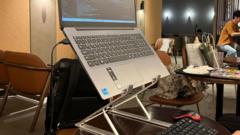In the vibrant neighborhoods of Seoul, cafés are experiencing a growing dilemma related to a cultural trend known as Cagongjok. This term describes young South Koreans who frequently occupy coffee shops to study or work, often staying for hours at a time. Hyun Sung-joo, a café owner in the affluent neighborhood of Daechi, highlights the issue as he recalls a recent customer who set up an elaborate workspace featuring two laptops and a six-port power strip, occupying a single table for an entire day. Due to high rents in the area, he has found it challenging to accommodate such customers who linger excessively.
While Cagongjok thrives in South Korea, it poses unique challenges compared to Western countries where study spaces within cafés tend to be more balanced with social customers. In response to disruptive cases at Starbucks, the coffee chain instituted new guidelines aimed at limiting seat monopolization without directly asking customers to leave. The chain's focus is on fostering a comfortable atmosphere for all patrons amid rising reports of theft from unattended belongings.
Even after the new measures, many moderate Cagongjok still frequent Starbucks, utilizing the space for study. An 18-year-old student mentioned she arrives around 11 a.m. and often leaves her belongings while she grabs a meal, reflecting the reliance on coffee shops as study havens. While the new restrictions are in place, Starbucks acknowledges that confirming the effectiveness of the guidelines remains challenging.
Public opinion on these restrictions varies. Many welcome them as a necessary adjustment to restore a social atmosphere that has been altered by prolonged studying. Others criticize the changes, worrying it may detract from the relaxed vibe Starbucks has offered. This discourse continues amid a significant increase in coffee shops in South Korea, with nearly 100,000 now operating in the country.
Different establishments are taking varied approaches to the Cagongjok phenomenon. While some cafes have introduced stricter two-hour limits for study sessions, others, including Hyun's, maintain a welcoming stance toward considerate customers who balance social activities with study. As this cultural shift unfolds, there are calls for more designated spaces that cater to studying without encroaching on the experience of others.
The underlying reasons for Cagongjok's prominence stem from a demanding societal landscape. Many young individuals seek solace in café environments, providing them with a safe space to escape personal challenges at home, as shared by Yu-jin Mo, a 29-year-old who felt more comfortable studying in coffee shops. Professor Choi Ra-young highlights this phenomenon as driven by South Korea’s competitive job market and limited public resources, pointing towards a need for more inclusive study environments in the future. As the discussion on Cagongjok continues, the balance between social relaxation and dedicated study remains tenuous.

















